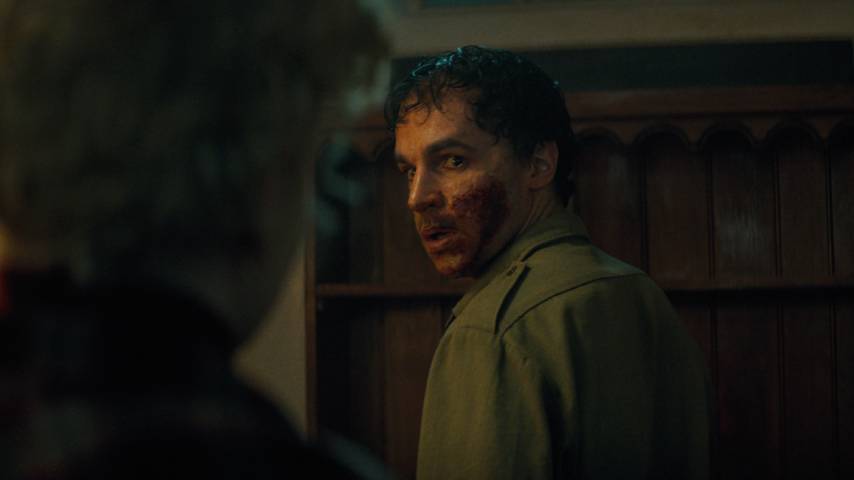Nobody knows what it’s like, to be the Wolf Man
Leigh Whannell returns to the Universal vein and shoots this werewolf tale full of modern anxiety.
Photo: Universal Pictures
Fear is contagious, and it can evolve into something worse. So too can the false certainty that the things we fear can be outplanned or outwitted. An anxious film initially written during the height of COVID, Wolf Man is a hairy hybrid of creature feature and family tragedy much like George Waggner’s ‘40s original. It’s also another clever Universal Monster update from filmmaker Leigh Whannell (and Corbett Tuck, his co-writer and wife) after he saw through The Invisible Man and focused on his victim. Wolf Man eschews the lore. There are no full moons, beds of wolfsbane, silver bullets, or pentagrams here. “Wolf” is barely said out loud, let alone “werewolf.” In their place are feverish sweats, inherited weaknesses, and a film torn between ripping out a throat and licking its own wounds.
Wolf Man mostly takes place over a single night, on a single farm. Blake (Christopher Abbott) has just returned to the isolated homestead, along with his wife Charlotte (Julia Garner) and daughter Ginger (Matilda Firth), after his missing oorah dad has finally been declared dead. From the second Blake’s father calls 7:00 AM “0700” in the tense, lushly shot prologue, the main dynamic is telegraphed: Overprotective, angry military dad traumatizes his son out of fear for his safety; son who runs off to be a city boy fails to entirely avoid repeating the past. Add lycanthropy, and stir.
This early metaphor can feel a little mangy, its emotional logic falling apart in nasty little clumps, especially since the family lacks characterization after their introductory scenes. Blake’s temper with Ginger is brief and quickly forgotten. He and Charlotte are loving, but fragile. Their spats and the tension between them is lived-in, the hurt as tired as the gestures made to heal it. Whannell and Tuck make the most of these grounded conflicts, especially since, once the family heads into the woods, a different allegory rears its head and bays at the moon.
Encountering a monstrous figure on a moonlit road, who slices Blake’s arm and chases the group into his childhood home, the freaked-out family stays in shock as the inevitable infection and transformation of its patriarch unfolds over the evening. This is a process that takes up most of the runtime, and also transforms Wolf Man from a film that feints at being about “trauma” into a film about the harsh, random cruelty of death. This became tangible thanks to the pandemic, with loved ones slipping away before anyone could even wrap their heads around it. Blake doesn’t writhe on the floor as his face stretches into a snout. Rather, he rapidly succumbs to something; he gets sweaty, clammy, incapable of communicating. Whannell washes the film out into something grim and grimy, his monster worsening with each scene.
And throughout, the beast that cursed him stalks around outside. Supposedly. Whannell struggles to balance the thrills and the sadness, each more academic—we know we’re supposed to be scared of a werewolf, supposed to care that this child is losing her father—than visceral. That’s a product of the script, which can get repetitive as the family flees back and forth between the farm’s various buildings, and its thin characters. Garner turns in a few perfectly calibrated “oh shit” faces and Abbott gets downright doggish (Firth is mainly around for one of those cutesy kid-parent gimmicks, this time one where she “reads” her dad’s mind), but the family’s connection is brief and slight, so its deterioration is no great loss.
More affecting is Blake’s eroding humanity. Whannell adds a flourish here, switching perspectives between family members mid-scene so that the film’s color, light, and sound blur from human mode to wolf mode. It’s not just that Blake’s teeth are sharpening and his hair is falling out—shouldn’t a werewolf get more hairy rather than less?—but that he’s leaving a whole world behind. These moments are more effectively disconcerting than the attack sequences or actual make-up work, which is gross rather than scary. Blake starts looking like he was recently found chained outside in a wintery ASPCA ad.
But even though his monster is visible this time around, Whannell still works wonders with the unseen. Wolf Man’s opening segment is almost a mini Predator film, New Zealand vibrantly standing in for the forests of Oregon as a hunting trip spirals out of control. Sounds, mainly footsteps and heavy panting, fill the relatively sparse frames and allow the imagination to take over as Whannell draws our attention to the dark corners. It’s a bit of a disappointment when the film relents and actually shows off its centerpiece creature.
Yet, Wolf Man rarely bares its teeth, opting instead for tail-tucked melancholy. Relatively absent of jumpy gotchas or relieving humor—though there is a slightly tongue-in-cheek moment involving a doggy door—the film relies on injecting its Gothic origins with a dose of modern dread. Dangers lurk outside the home, but could just as easily infiltrate it. The march of death could hasten its pace for anyone at any time, rendering those around them impotent. These are recognizable during Wolf Man, though its duties as an R-rated Blumhouse horrorshow keeps it from fully embodying them. It’s left as a half-breed mutt: lovable, but distinctly divided.
Director: Leigh Whannell
Writer: Leigh Whannell, Corbett Tuck
Starring: Christopher Abbott, Julia Garner, Sam Jaeger, Matilda Firth, Benedict Hardie, Ben Prendergast, Zac Chandler, Beatriz Romilly, Milo Cawthorne
Release Date: January 17, 2025